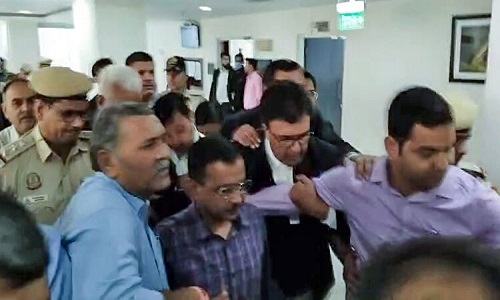From anti-graft crusader to ‘kingpin’ of liquor cartel
| Date :27-Mar-2024 |

By Deepika Bhan
In his 13-year political career, which began with the massive cause of delivering transparent, honest and corruption-free governance, Kejriwal has hobnobbed with all those whom he called corrupt and adopted policies that gave impetus to corruption. The law will take its own course, but the people who believed that the ‘Jhadu’ will do the cleaning in the system are feeling betrayed today.
DELHI Chief Minister Arvind Kejriwal, once a prominent anti-corruption crusader, is now the ‘kingpin’ of liquor cartel as per the Enforcement Directorate, which is probing the case.
The downfall is not shocking as one by one, his close associates have fallen in the net. The denial of any relief by the courts has added to the public perception that there is ‘something’ sinister. Questions are being raised about his commitment to fight corruption and his betrayal of the ‘jhadu’ (broom).
The ‘jhadu’ is the election symbol of Aam Aadmi Party (AAP). According to the party, it signifies “dignity of labour” and commitment to “clean the filth which has permeated the government and legislature”. But today, many of the party leaders and its supremo have been arrested on charges of doing the exact opposite.
His supporters and the Opposition leaders are crying foul. His guru, Anna Hazare, however, had raised the red flag a long time ago. In 2022, Hazare wrote a letter to CM Kejriwal saying that he was “intoxicated by
power.” The guru was pained by the AAP Government’s liquor policy and he knew that his protégé was taking a wrong turn. A massive mandate in Delhi Assembly, not once but twice -- 2015 (with 67 seats) and 2020 (with 62 seats) -- can be any politician’s dream. Absoluteness has its own hazards and it did create a perfect condition for Kejriwal to be the be-all end-all in his party.
While outside AAP forums, he swore by democracy and honesty, within the party, he stymied criticism. He shrewdly plucked out the contrarian voices that did not have a place in his scheme of things. Prashant Bhushan and Yogendra Yadav were forced out of the party in 2015. His other partners, Ashutosh, Kumar Vishwas, Kapil Mishra and others, too, were made to bow out.
In fact, Kapil Mishra, who was sacked from the post of Delhi Water Minister in 2017, accused Chief Minister Arvind Kejriwal of accepting a bribe of Rs two crore in cash at his official residence from the then Health Minister Satyendra Jain. This was the first graft allegation against Kejriwal, and that too from a former Cabinet colleague.
The Shunglu Committee formed by former L-G Najeeb Jung in 2017, accused the AAP Government of “gross misuse of power”. It was on this committee’s report that
Anna Hazare had expressed that Kejriwal has dashed all his hopes. AAP’s deviation from its core principles was evident soon after Kejriwal’s second term in 2015. The party’s top 14 leaders, including the Chief Minister, Ministers and MLAs, have been arrested on different charges.
In 2015, the then Law Minister Jitender Singh Tomar was arrested for allegedly submitting forged law degree while filing his nomination for the Assembly polls.
In May 2022, Satyendar Jain was arrested by ED in an alleged money laundering case. Delhi Waqf Board chairman Amanatullah Khan was arrested in connection with a complaint alleging illegal appointments and unauthorised renting out of Waqf Board properties in the city in September 2022.
And over the years, charges of wrongdoings in many of his welfare schemes have also surfaced from time to time.
However, the biggest
scam has been the excise policy case. The then Deputy CM Manish Sisodia was arrested after an eight-hour questioning by the Central Bureau of Investigation in the case. The Enforcement Directorate, in 2023, arrested AAP’s Rajya Sabha MP Sanjay Singh, in the money laundering case linked to the investigation into the liquor policy. And now, finally the CM himself, who is said to be the ‘kingpin’ of the excise policy scam, finds himself in lock-up.
Kejriwal has no one except perhaps himself to blame for the situation that he is in today. The bid to roll-out an ultra-fast political flight to the nation’s top political post has perhaps crash-landed him badly. Soon after his Delhi win, Kejriwal wanted to quickly encroach the political space in other states.
His plans to rise to the national scene instantly became clear when in 2014, he unsuccessfully fought against the then PM candidate Narendra Modi in Varanasi. Kejriwal also put in all his efforts in Gujarat and Goa Assembly elections, but in both places, he had to eat humble pie. Punjab, however, gave him another big win. In his 13-year political career, which began with the massive cause of delivering transparent, honest and corruption-free governance, Kejriwal has hobnobbed with all those whom he called corrupt and adopted policies that gave impetus to corruption. He joined hands with those whom he had earlier promised to send behind bars. He even took pledges, but soon broke them when he entered into alliance with Congress in 2013. His associations with those whom he had red-flagged earlier, has earned him the title of being ‘politically dishonest’.
On March 21, late at night, when Kejriwal was arrested, his journey from an anti-graft crusader to a ‘kingpin’ of liquor scam and CM behind bars was unprecedented.
The law will take its own course, but the people who believed that the ‘Jhadu’ will do the cleaning in the system are feeling betrayed today.


